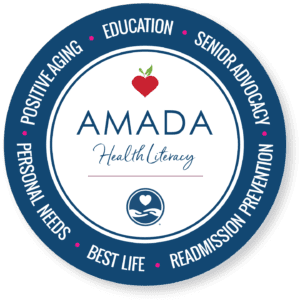Health literacy is the ability to understand and use health information to make informed decisions about one’s health. For seniors aged 65 and older, health literacy is particularly crucial. As people age, they often face complex health challenges, increased interactions with healthcare systems, and a greater need for preventive and ongoing medical care. However, navigating these systems and making informed decisions can be challenging without strong health literacy skills.
October has been marked as Health Literacy Month to promote understanding of what health literacy entails, why it is essential for seniors’ health, and how improved health literacy can enhance their quality of life.
What is Health Literacy?
Health literacy goes beyond reading and understanding medical terms; it involves the ability to:
- Understand and follow medication instructions,
- Interpret lab results and health documents,
- Recognize and follow healthcare provider recommendations, and
- Make informed choices about diet, exercise, and lifestyle habits based on accurate health information.
For older adults and seniors, health literacy also includes being able to evaluate the accuracy of health information from multiple sources, such as websites, social media, or even friends and family. This ability helps seniors to filter out misleading health information, focus on what can genuinely support their health, and take the proactive steps needed to a better quality of life.
Why Health Literacy is Vital for Seniors
As we age, healthcare needs typically become more complex, often involving multiple specialists, medications, and treatments. Seniors with high health literacy skills are better equipped to manage these complexities and are often better able to avoid issues like medication mismanagement or unnecessary hospitalizations. Below are some key reasons why health literacy is particularly crucial for the 65-and-above age group:
Managing Chronic Conditions:
Nearly 80% of adults aged 65 and older have at least one chronic health condition, and managing these often requires a detailed understanding of medication regimens, lifestyle changes, and regular monitoring. Health literacy empowers seniors to take active control of their conditions, potentially leading to better outcomes and a higher quality of life.
Making Informed Healthcare Decisions:
Seniors are often faced with important healthcare decisions, from selecting insurance plans to choosing treatment options. With strong health literacy, they are more likely to understand the risks and benefits of various options and communicate their preferences to healthcare providers, leading to better-aligned care.
Preventing Errors and Misunderstandings:
Misunderstandings around health information can lead to serious health consequences. For instance, misunderstanding medication instructions or misinterpreting lab results can result in incorrect actions. Health literacy helps seniors accurately follow health instructions and reduces the likelihood of errors.
Increasing Confidence in Healthcare Interactions:
Health literacy enhances a senior’s ability to interact confidently with healthcare providers. This includes asking the right questions, expressing concerns, and understanding responses—all of which contribute to a more supportive healthcare experience.
Reducing Healthcare Costs:
Seniors with low health literacy are more likely to have hospital stays, emergency visits, and higher healthcare expenses. Improved health literacy can reduce unnecessary healthcare visits by enabling seniors to better manage health issues at home and avoid emergency situations.
Ways to Improve Health Literacy Among Seniors
There are several effective strategies that caregivers, families, and healthcare providers can use to support seniors in improving their health literacy:
- Encourage Open Dialogue with Providers: Building a relationship with healthcare providers that encourages questions and ensures clarity is essential.
- Simplify Health Information: Providing easy-to-understand, visual, and step-by-step health information can help seniors feel more in control of their health.
- Utilize Community Resources: Many community centers and senior organizations offer health literacy programs specifically designed for older adults.
- Leverage Technology: Teaching seniors to use reliable online resources and apps for medication reminders or tracking health metrics can help bridge literacy gaps.
- Support Family and Caregiver Involvement: When family members are involved, they can reinforce important health information and serve as a second set of eyes and ears during medical appointments.
Preserving Senior Independence Through Health Literacy
Health literacy is a critical component of well-being for seniors. By equipping seniors with the knowledge and tools to make informed health decisions, we help them gain independence and confidence in managing their health. For seniors, caregivers, and healthcare providers, focusing on health literacy can be a valuable path toward improved health outcomes, reduced stress, and an enhanced quality of life.
An Amada Senior Care advisor can assist seniors and families in creating an in-home care plan for seniors managing the symptoms of a chronic health condition. Amada is here for seniors and their families as a Health Literacy resource, so feel free to call us toll-free at 866-752-1961 or CLICK HERE to find an Amada franchise location near you.



